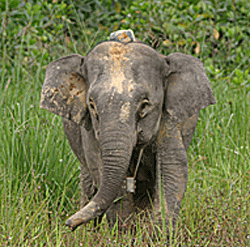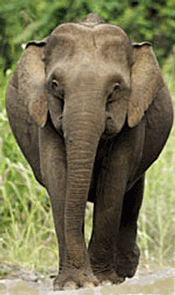Global Positioning System (GPS), Used in Tracking Elephants
(satellite tracking pygmy elephants in order to learn more about these little pachyderms)
GPS is being used to help the World Wildlife Fund shed light on the pygmy elephants in Malaysia
Satellite Tracking Five Pygmy Elephants in Borneo
For the first time, Borneo pygmy elephants have been outfitted with collars that send their GPS coordinates to a satellite several times a day, allowing the World Wildlife Fund (WWF) to track the elephants' movements so they and their habitat can be studied.

In June, 2005, the World Wildlife Fund outfitted the five pygmy elephants with GPS satellite collars and began tracking them through the forests of Borneo for two years to learn more about these little pachyderms.
"No one has ever studied pygmy elephants before, so everything we're learning is groundbreaking data," said Christy Williams, who leads WWF's Asian elephant conservation efforts and worked with experts to use GPS satellite technology to track Asian elephants for the first time.
The World Wildlife Fund and Columbia University researchers proved in 2003 that the elephants on Borneo (the world's third-largest island) are genetically distinct from other Asian elephants and are considered to be a new subspecies.

Pygmy elephants are smaller, chubbier and more gentle-natured than other Asian elephants. They are found only on the northeast tip of Borneo, mainly in the Malaysian state of Sabah.
The scientific world knows almost nothing about these pygmy elephants. How many are there? Do they form the same matriarchal societies as other elephants? Why do they live only in a tiny pocket of forest on the northeast tip of Borneo?
One thing that is known is that they are under severe threat as their jungle habitat is considered prime real estate for commercial palm oil plantations.
As they must search harder for food in a shrinking habitat, they are often seen as crop-raiding pests by plantation workers and small farmers.
The World Wildlife Fund estimates that there are as few as 1,500 pygmy elephants remaining, but further research is needed to determine a more accurate count.
- Most of the elephants spend at least some of their time in palm oil plantations or near human habitation, which leads to conflict with people.
- In recent years, much of the elephants' habitat has been converted to tree plantations that produce palm oil, the leading export crop for Malaysia.
- Each elephant with the GPS collar belongs to a herd of 30-50 elephants but they often split off into smaller groups for days or weeks at a time.
- The home ranges of two of the elephants who were collared in nearby forests, overlap, suggesting that the two elephants' groups may be related.
- Since elephants live in matriarchal societies, WWF collared only adult female elephants so that each elephant collared represents a whole herd's movements.
The World Wildlife Fund plans to keep following these pygmy elephants for years with GPS technology so their home ranges can provide the Malaysian government with the needed data to make better decisions as to which areas may be available to the elephants for better preservation of this special species.
The Sabah Wildlife Department described the study as very important and said the results could be used to assist the department in preparing the Malaysian state of Sabah's elephant conservation plan.
The World Wildlife Fund organization is conducting this study in cooperation with the Sabah (Malaysia) Wildlife Department and with the support of the U.S. Fish and Wildlife Service.
In addition to the pygmy elephants, there are several other endangered species that need attention
- Borneo is one of only two places (the other being Indonesia's Sumatra island) where endangered orangutans, elephants and rhinos co-exist. Other threatened wildlife in Borneo includes clouded leopards, sun bears and Bornean gibbons, the latter found nowhere else in the world. The island is also home to ten primate species, more than 350 bird species, 150 reptiles and amphibians and 15,000 plants.
- An ambitious initiative is under way to conserve the "Heart of Borneo." WWF is working to assist Borneo's three nations (Malaysia, Indonesia and Brunei) to conserve the area known as the Heart of Borneo (a total of 137,000 square miles of equatorial rain forest) through a network of protected areas and sustainably managed forest.
- Large areas of Borneo's forest are being rapidly cleared and replaced with tree plantations for rubber, palm oil and timber production. The illegal trade in exotic animals is also on the rise, as logging trails and cleared forest open access to more remote areas.
Related topics about "technology": Biomimetics: Index; Biopiracy; Emerging Technologies; Geographic Information System (GIS): Index; Global Navigation Satellite System (GLONASS); Global Positioning System (GPS); Information Tech; Mechatronics; Nanotechnology; RFID; Robotics; Technological Breakthroughs; Technological Innovations; WAAS; Wireless Communications.
